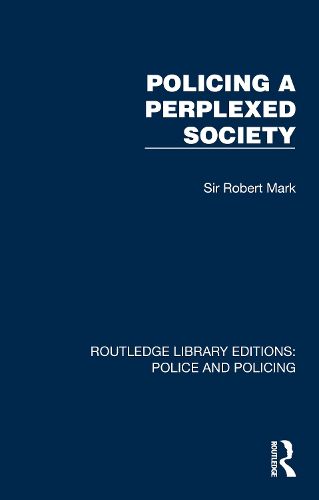Readings Newsletter
Become a Readings Member to make your shopping experience even easier.
Sign in or sign up for free!
You’re not far away from qualifying for FREE standard shipping within Australia
You’ve qualified for FREE standard shipping within Australia
The cart is loading…






Should policemen be armed? Do they want to be? How fair is police interrogation? Are the police too tough on demonstrators? How often are the guilty acquitted? Do we get the police force we deserve? Originally published in 1977, Sir Robert Mark considers these and many other issues.
His period as Commissioner of the Metropolitan Police Force would mark something of an epoch, not only because of the challenge of brutal terrorism or his success as a leader, but because he was a bold innovator, thoughtful and articulate, whose work could be readily assessed because he believed in 'telling the public all you can' (the official memorandum on this appears here as an appendix). One change affecting the CID, described in this book, is characterised by Sir Robert himself as the most important single change since the Metropolitan Police was founded by his namesake Sir Robert Peel.
The opening chapter describes the organisation and functioning of this country's police at the time, the way in which they epitomise and are restricted by a free society and alone see the whole picture of criminal justice - in a sense here Sir Robert speaks over the heads of the legal profession to the public. The next important chapter contains the first open discussion of modern police-army cooperation in this country, but Sir Robert emphasises that a democratic society cannot be controlled by force and that the police exist for the maintenance of public order, irrespective of party, of sectional interests and of the government of the day. They are an example of the British genius for successful institutional compromise.
Subsequent chapters examine these themes in more detail and from different angles; discuss manpower limitations and maldistribution; emphasise how the individual police officer, man or woman, is the anvil on which society beats out the problems of social inequality, racial prejudice and ghettoes, weak and ineffectual legislation. There are chapters on violence and on that London speciality, the demonstration. In the author's view, the police officer, daily thrown back on his understanding of basic Christian precepts, has now left his Victorian 'artisan status' far behind - and the present Metropolitan Commissioner compels consideration of the police officer's point of view.
$9.00 standard shipping within Australia
FREE standard shipping within Australia for orders over $100.00
Express & International shipping calculated at checkout
Should policemen be armed? Do they want to be? How fair is police interrogation? Are the police too tough on demonstrators? How often are the guilty acquitted? Do we get the police force we deserve? Originally published in 1977, Sir Robert Mark considers these and many other issues.
His period as Commissioner of the Metropolitan Police Force would mark something of an epoch, not only because of the challenge of brutal terrorism or his success as a leader, but because he was a bold innovator, thoughtful and articulate, whose work could be readily assessed because he believed in 'telling the public all you can' (the official memorandum on this appears here as an appendix). One change affecting the CID, described in this book, is characterised by Sir Robert himself as the most important single change since the Metropolitan Police was founded by his namesake Sir Robert Peel.
The opening chapter describes the organisation and functioning of this country's police at the time, the way in which they epitomise and are restricted by a free society and alone see the whole picture of criminal justice - in a sense here Sir Robert speaks over the heads of the legal profession to the public. The next important chapter contains the first open discussion of modern police-army cooperation in this country, but Sir Robert emphasises that a democratic society cannot be controlled by force and that the police exist for the maintenance of public order, irrespective of party, of sectional interests and of the government of the day. They are an example of the British genius for successful institutional compromise.
Subsequent chapters examine these themes in more detail and from different angles; discuss manpower limitations and maldistribution; emphasise how the individual police officer, man or woman, is the anvil on which society beats out the problems of social inequality, racial prejudice and ghettoes, weak and ineffectual legislation. There are chapters on violence and on that London speciality, the demonstration. In the author's view, the police officer, daily thrown back on his understanding of basic Christian precepts, has now left his Victorian 'artisan status' far behind - and the present Metropolitan Commissioner compels consideration of the police officer's point of view.